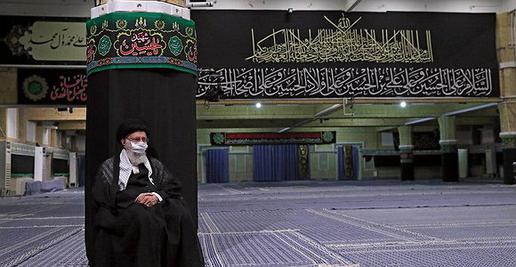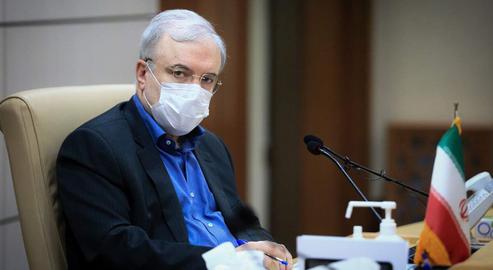Religious ceremonies and holiday travels stoke fears of a coronavirus resurgence
Every year, during the Islamic lunar calendar month of Muharram – one of Shia Islam’s holiest periods, when people mourn the martyrdom of Imam Hossein, the third Shia Imam, who died in 680 AD – Iran’s Supreme Leader Ayatollah Ali Khamenei presides over a series of high-profile mourning ceremonies at Imam Khomeini Hussainiya, a congregational hall for religious gatherings. But on August 24, Khamenei’s office announced that “this year, in accordance with health guidelines and criteria announced by the National Coronavirus Taskforce, the mourning ceremonies at Imam Khomeini Hussainiya will not be open to the public.”
Some ceremonies have taken place over the past several evenings, but privately and with only Khamenei, one Shia eulogist, one preacher and a camera crew. Iran’s domestic media has widely circulated photographs of Khomeini at the events in the large but mostly empty hall.
Closing the hall to the public was meant to encourage people to comply with distancing and other health guidelines during Muharram, when Shias traditionally hold crowded mourning ceremonies and processions. In a letter to Khamenei, Dr. Mohammad Reza Zafarghandi, president of Iran’s Medical Council, thanked him for setting an example for all mourners in Iran.
But the reality on the ground over the past few days has not completely matched Khamenei’s example and the expectations of Zafarghandi. Despite a ban on processions by the National Coronavirus Taskforce, many pictures of such processions from different cities of Iran have been posted on social media, even though in some specific cases the ban was observed, in cities such as Qom and Qazvin.
This year’s Muharram religious holidays also coincided with summer, when many residents of central Iranian provinces tend to travel to the picturesque northern provinces of Gilan and Mazandaran and the coast of the Caspian Sea. Health officials have been warning against such travels during the pandemic for weeks and today, not for the first time, Health Minister Saeed Namaki literally begged people to take pity on themselves and on health workers and to avoid traveling for pleasure.
Holidays and hospitalizations
In one of these provinces, Gilan, the number of new hospitalizations has increased by 15 compared to the days before the holidays. Dr. Abtin Heydarzadeh, vice president of the Gilan University of Medical Sciences, reported that the number of hospitalizations in the province had passed 370 and “unfortunately the daily number of patients who are released from hospitals has declined. A number of travelers who had visited emergency centers are now hospitalized as well.”
According to Dr. Heydarzadeh, 40 percent of new hospitalizations are due to holiday travels. “It is really immoral to come to Gilan from other provinces and to infect your friends and relatives and even cause their deaths,” he said. “I ask tourists to remain in one place, not to move around the province, and to cut short their vacations.”
In the city of Babol, in Mazandaran province, the number of hospitalized Covid-19 patients has declined by 50 percent but, according to Dr. Farzad Jalali, president of Babol University of Medical Sciences, the consequences of the arrival of tourists will become apparent within the next two weeks. He claimed that the second wave of coronavirus in Gilan, an early epicenter of the pandemic in Iran, was ending when tourists started to arrive, and he asked people to follow health guidelines meticulously to prevent a third wave from breaking out.
In late June the number of hospitalizations in Babol and its surrounding areas had reached 360; today it has fallen to 179. In the hospitals run by the Babol and Mazandaran medical universities a total of 877 coronavirus patients are hospitalized at the present time.
“Mazandaran is in a state of red alert and I advise people not to travel to Mazandaran,” said Colonel Mohammad Sadegh, the commander of police in the provincial city of Savadkuh. “According to national statistics, every individual trip increases the chances of coronavirus infection by 1.9 percent and I really beg people to avoid traveling.”
The number of Covid-19 patients in the province of Hormozgan has declined but in the two areas of Jask and Sirik it is rising. “With yesterday’s deaths [on August 28], the number of fatalities reached a total of 698 in Hormozgan,” said Dr. Hossein Farshidi, president of Hormozgan University of Medical Sciences. “In this week the number of fatalities in Hormozgan declined but nine percent more coronavirus patients were admitted to the hospitals.”
Provinces round-up
In her daily briefing for August 29, Health Ministry spokeswoman Dr. Sima Sadat Lari said that currently 13 provinces are in a red state of alert and 15 provinces are in an orange state:
- Red: Tehran, Mazandaran, Gilan, Qom, Isfahan, Razavi Khorasan, East Azerbaijan, Kerman, North Khorasan, Semnan, Yazd, Zanjan and Qazvin
- Orange: West Azerbaijan, Alborz, Fars, Lorestan, Hormozgan, Ardebil, Bushehr, Kermanshah, Kohgiluyeh and Boyer Ahmad, South Khorasan, Markazi, Ilam, Chaharmahal and Bakhtiari, Golestan and Khuzestan
Dr. Lari also announced the official coronavirus statistics for the past 24 hours:
- New confirmed coronavirus cases: 1,905
- New hospitalizations: 857
- Total cases since the outbreak: 371,816
- Total coronavirus tests conducted in Iran: 3,184,857
- Total recovered from coronavirus: 319,847
- New fatalities: 110
- Total death toll since the outbreak: 21,359
This is part of IranWire's coronavirus chronology. Read the full chronology
visit the accountability section
In this section of Iran Wire, you can contact the officials and launch your campaign for various problems



























comments